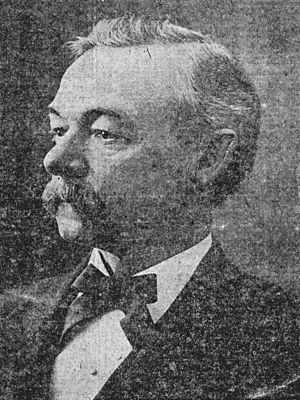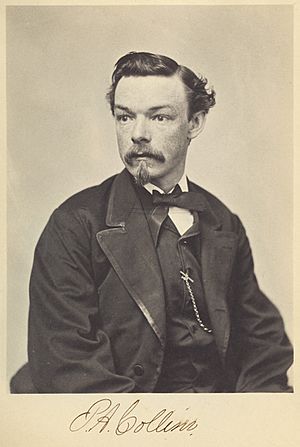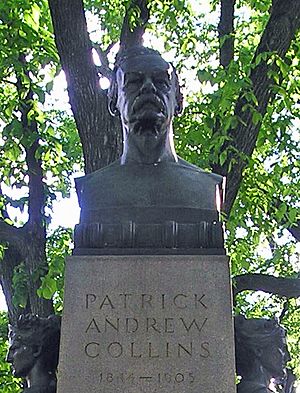Patrick Collins (mayor) facts for kids
Quick facts for kids
Patrick Andrew Collins
|
|
|---|---|
 |
|
| Mayor of Boston | |
| In office January 6, 1902 – September 13, 1905 |
|
| Preceded by | Thomas N. Hart |
| Succeeded by | Daniel A. Whelton (acting) |
| Member of the U.S. House of Representatives from Massachusetts's 4th district |
|
| In office March 4, 1883 – March 3, 1889 |
|
| Preceded by | Leopold Morse |
| Succeeded by | Joseph H. O'Neil |
| Member of the Massachusetts Senate | |
| In office 1870–1871 |
|
| Member of the Massachusetts House of Representatives | |
| In office 1868–1869 |
|
| Personal details | |
| Born | March 12, 1844 Fermoy, County Cork, Ireland |
| Died | September 13, 1905 (aged 61) Hot Springs, Virginia, U.S. |
| Political party | Democratic |
| Spouse | Mary E. (Carey) Collins |
| Children | 2 daughters, 1 son |
| Residence | Boston, Massachusetts |
| Alma mater | Harvard Law School |
| Profession | lawyer |
Patrick Andrew Collins (March 12, 1844 – September 13, 1905) was an important American politician and lawyer. He served as the Mayor of Boston and was also a U.S. Representative for Massachusetts.
Contents
Who Was Patrick Collins?
Growing Up in America
Patrick Collins was born on March 12, 1844, in Fermoy, County Cork, Ireland. When he was four years old, his father passed away. Soon after, his family moved to the United States. They settled in Chelsea, Massachusetts, in 1848.
Patrick went to public schools until he was 12. After that, he worked different jobs in Massachusetts and Ohio. When he was 15, he returned to Boston. There, he learned how to make and fix furniture, a skill called upholstery. He became a leader in the upholstery shop. He also became active in groups that helped workers, known as trade unions. He was a secretary for his union and a representative for workers.
Patrick wanted to become a lawyer. He saved his money and started getting involved in politics.
A Life of Public Service
In 1867, Patrick Collins was chosen to run for a seat in the Massachusetts House of Representatives. He was elected and served two terms, in 1868 and 1869. While serving, he also studied law at Harvard Law School. He graduated and became a lawyer in 1871.
After that, he served two terms in the Massachusetts Senate in 1870 and 1871. He practiced law in Boston. In 1875, he became a judge advocate general for Massachusetts. This role involves legal work for the military. He also attended several big meetings for the Democratic Party.
Patrick Collins was elected to the U.S. Congress in 1882. He served three terms from 1883 to 1889. During this time, he also led the Democratic State Committee. In 1889, he left Congress and went back to being a lawyer. He also served on the boards of several companies.
From 1893 to 1897, Patrick Collins worked as a consul general in London. He represented the U.S. government there under President Grover Cleveland.
Mayor of Boston
Patrick Collins ran for Mayor of Boston three times. In December 1899, he lost his first attempt. However, in December 1901, he won the election. He became the mayor of Boston. He was re-elected in December 1903.
Collins served as mayor from January 1902 until he passed away. He died on September 13, 1905, while visiting Hot Springs, Virginia. He was buried in Holyhood Cemetery in Brookline, Massachusetts. A special memorial was created for him. It includes a bronze sculpture by a famous artist named Cyrus Edwin Dallin.
See also
- 1868 Massachusetts legislature
- 1870 Massachusetts legislature
- 1871 Massachusetts legislature
- Timeline of Boston, 1880s-1900s
Images for kids
 | Stephanie Wilson |
 | Charles Bolden |
 | Ronald McNair |
 | Frederick D. Gregory |




